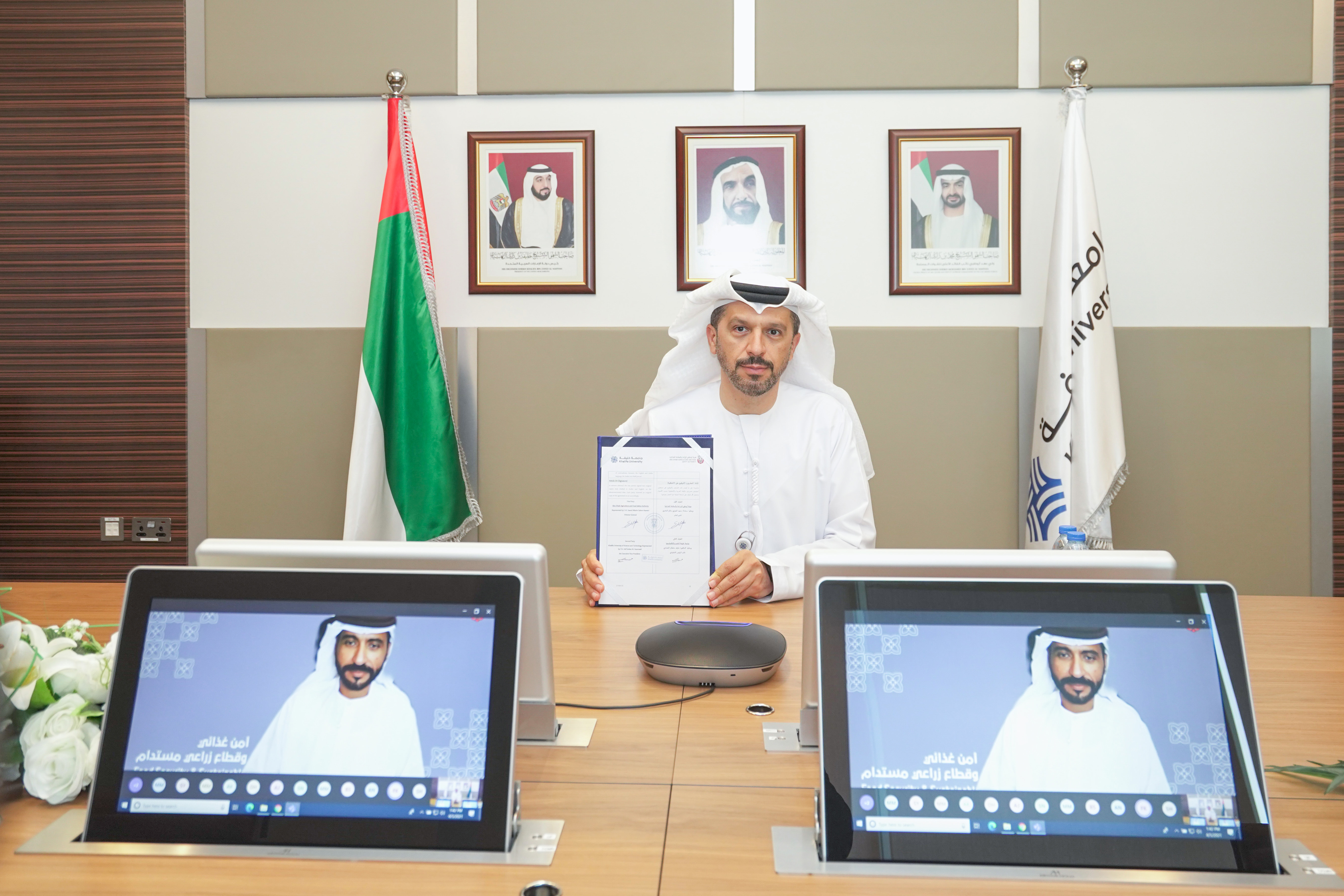
Project to Focus on Engineering, Scaling-up and Commercialization of Novel Class of Selective Ion Sponges for Desalination
Khalifa University and the Abu Dhabi Agriculture and Food Safety Authority (ADAFSA) announced they have signed a research collaboration agreement to jointly fund a project to engineer, scale-up and commercialize a novel class of selective ion sponges for desalination supporting enhanced water recovery and a circular approach to desalination.
The agreement was signed by Dr. Arif Sultan Al Hammadi, Executive Vice-President, Khalifa University and His Excellency Saeed Albahri Salem Alameri, Director-General, ADAFSA. The project represents both the partners’ intense involvement in water management and food security – two sectors strategic for the UAE.
The project will lead to the delivery of intellectual property (IP) in desalination, advanced materials design, process integration and trigger responsive systems, with applications and scope of study spanning far beyond the project’s ambit. It will also place Khalifa University, ADAFSA and the UAE in a leadership position in advanced separation materials design for the development of a significant and scalable technology for desalination. Additionally, it will find potential applications beyond desalination in areas such as resource recovery, selective toxins or pathogens removal, and nutrients benefaction. Highly novel materials and manufacturing routes are also expected to be developed and translated in the scale-up stage.
Dr. Al Hammadi said: “Khalifa University is delighted to enter into this partnership with ADAFSA and inspire innovation in the UAE’s strategic sectors. In addition to food security and desalination, this project is expected to yield IP in several related sectors, which will help highlight the UAE’s role in advancing development of fresh technologies. We believe our expert faculty, who are leading this research project with their collaborators, will not only drive innovation but will also develop human capital for the local and regional industries.”
H.E Saeed Alameri said: “We are happy to collaborate with Khalifa University in conducting this research project, which will create environmentally and economically sustainable freshwater resources. Due to the increased pressure on the available water resources and the depletion of groundwater, there is a pressing need for investing in scientific research to localize modern technologies and innovations in desalination.”
Alameri noted the agriculture sector is the largest consumer of groundwater in the Emirate, stressing this collaboration stems from ADAFSA’s keenness on leveraging all possible opportunities to achieve agricultural sustainability, thus boosting the food security of Abu Dhabi and the UAE in general.
The project was initially submitted to Khalifa University within ADAFSA’s efforts to build strategic partnerships with key research entities in the UAE, to develop the agricultural and food sector. It was prioritized as water is of the essential natural resources used in agricultural production, especially as this sector faces many challenges in providing the needed irrigation water for crops.
The project will be led by Dr. Ludovic Dumee, Assistant Professor, Chemical Engineering, an expert in advanced and responsive separation materials development at Khalifa University, who will be assisted by post-doctoral researchers and two PhD students. Dr. Hassan Arafat, Director, Khalifa University Center for Membranes and Advanced Water Technology (CMAT), and Professor, Chemical Engineering, will also support and co-lead this project.
From ADAFSA’s side, the research project will be supervised by a team specialized in economic, agricultural and irrigation development under the directives and follow-up of H.E. Saeed Alameri, ADAFSA’s Director General.
The project will eventually lead to development of a library of light responsive MOF materials and module configurations enabling relatively low-cost water recoveries, as well as analytical databases that can predict water quality based on ‘source’ waters. In addition, it will generate freshwater streams from saline groundwater or treated wastewaters at par quality or above that is required for farming applications, while leading to a scalable technology for deployment at the end of the project with relevant stakeholders in the water utilities and materials engineering areas.
Khalifa University’s CMAT focuses on advanced desalination technologies, nanomaterials and membranes, energy efficiency and sustainability of water processes, as well as technology transfer and capacity building in desalination.
Meanwhile, ADAFSA will follow-up and utilize the project’s outcomes in developing the agricultural sector and finding ways to desalinate water in a sustainable, economic and environmental manner, in cooperation with the stakeholders.
Clarence Michael
English Editor Specialist
6 April 2021